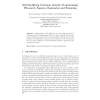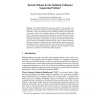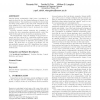602 search results - page 43 / 121 » Unsupervised Problem Decomposition Using Genetic Programming |
123
Voted
CEC
2010
IEEE
15 years 5 days ago
2010
IEEE
The great majority of genetic programming (GP) algorithms that deal with the classification problem follow a supervised approach, i.e., they consider that all fitness cases availab...
124
Voted
EUROGP
2009
Springer
15 years 8 months ago
2009
Springer
Self Modifying CGP (SMCGP) is a developmental form of Cartesian Genetic Programming(CGP). It is able to modify its own phenotype during execution of the evolved program. This is do...
126
click to vote
PPSN
1994
Springer
15 years 6 months ago
1994
Springer
This paper studies Genetic Programming (GP) and its relation to the Genetic Algorithm (GA). GP uses a GA approach to breed successive populations of programs, represented in the ch...
121
click to vote
CPAIOR
2010
Springer
15 years 5 months ago
2010
Springer
Abstract. The multileaf collimator sequencing problem is an important component of the effective delivery of intensity modulated radiotherapy used in the treatment of cancer. The p...
159
click to vote
GECCO
2005
Springer
15 years 7 months ago
2005
Springer
Particle Swarm Optimisation (PSO) uses a population of particles that fly over the fitness landscape in search of an optimal solution. The particles are controlled by forces tha...



